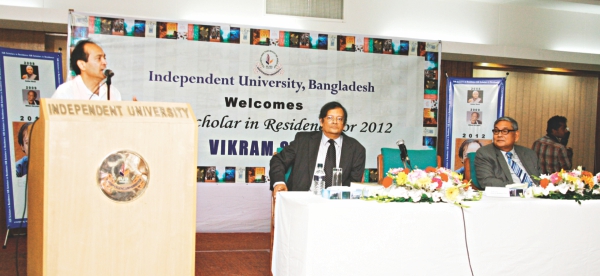Interview
IUB names Seth the 2012 Scholar in Residence
Sabhanaz Rashid Diya
To Vikram Seth, we all are accidents of history. Where we belong and who we become are part of that accident, and often raises questions on our upbringing, our roots. “I wonder if it would have been better if we could choose our parents,” said Seth. “Our lives become intertwined with many cultures, with many people – and instead of aimlessly searching for roots, I began embracing multiculturalism. My roots are those of my parents, the person I become is the product of the experiences I go through.”

Vikram Seth speaking at IUB.
It isn't Seth's first time at getting bombarded with questions on disparate cultures. He, like Jhumpa Lahiri, Manil Suri, Rohintin Mistry, Sujit Saraf and others are known for their tragicomic take on post-colonialism and the concept of identity. The family, the caste system, the offshore ties and sub-continental norms are combined in volumes of literature that has made Indian authors a genre of its own kind to the world. At a recent seminar organised by the Independent University Bangladesh (IUB) following the Hay Festival this year, Seth explores his take on post-colonial and modern literature.
“I believe in reconciling different parts of the world through my writings,” explained Seth. “My writings aren't governed by cultural identity, rather by the characters. I wouldn't put Indian colloquial words in italics because the writing is in American English. I would rather insist that the writing is published in American English if the context is Lower East Side Manhattan because the character, the plot demands it. The world should be true to itself.”
For Seth, Bangladesh holds the special place in the ties and tensions of the multiculturalism. His grandmother, on hearing her daughter was thinking of turning into a nun during her senior year in Cambridge in Darjeeling, sent her to Khulna with her elder son. While continuing her distance education, the daughter learnt to speak in Bangla, and in the absence of activities, excelled her examination. “If my mother ended up becoming a nun, I wouldn't have been born. And thankfully, because she had nothing else to do, she stood first in her exams and moved forward with her career. When she was pregnant with me, she was heavily influenced by Tagore's Shesher Kabita and decided to name me Amit. However, my father's family held a tradition of naming everyone with a B. In spite of my mother's best intentions, I was named Vikram – yet, when I come to Bangladesh, I feel like Amit. A part of me will always owe to Khulna,” reminisces Seth, laughing.
As the discussion at the Multipurpose Hall at IUB swung from Mappings to Two Lives, one of the students raised concerns about institutionalisation. As artists, the idea of institution is genetically baffling. Seth's background in Economics seems contradictory, admits Seth – and having lived off largely on the kindness of institutions around the world, he understands their necessity to human intellect. “Well, I was always conjuring poems in my head in the middle of my dissertation paper and when my professor asked why I missed deadlines, I couldn't possibly recite a few lines about estranged lovers to him,” shares Seth, bemused. “I do think institutions are somewhat valuable as well as deserve criticism. I suggest you 'fall ill' or 'have an accident' when you're writing something and need to stay away from class.”
But, how do you differentiate? How do you know you're meant to write? Can passion be the only trigger? “Not necessarily,” explains Seth. “I think the problem is when something we produce becomes well known, almost everything we do seems to have commercial viability. Just because one enjoys writing doesn't necessarily make it good – and success shouldn't govern passion. I feel it's extremely important to set filters in our minds and understand our writings. They can appear as poems or prose, but to determine whether it's good enough to survive is a personal and significant call.”
“What about movies? Have you ever considered it?” asks another student.
“I have been approached with scripts and those have been auctioned off with little effort from my end. I just got some pocket money,” Seth replied, grinning. “I don't feel comfortable with the idea of Lata (A Suitable Boy) getting frozen in silver screen. More often than not, a great director and a great actor transform the character of a novel into an archetypical something, and the audience can no longer imagine. Lata evolves as I evolve and for my selfish reasons, I enjoy that process.”
Vikram Seth rounded his session with recitations of Fire I and II. As the audience listened mesmerised, fyaah raged through the room and reminded us of Seth's candour, wit and poise. Mr Towhid Samad, Chairman of the Board of Trustees at IUB and Professor Dr Omar Rahman, Vice Chancellor at IUB delivered opening remarks, while Professor Niaz Zaman concluded the session. The Independent University Bangladesh named Vikram Seth its 2012 Scholar in Residence.
(Sabhanaz Rashid Diya is a major in Media and Communication at Independent University Bangladesh, and founder of the non-profit youth organisation, the One Degree Initiative Foundation)
|
